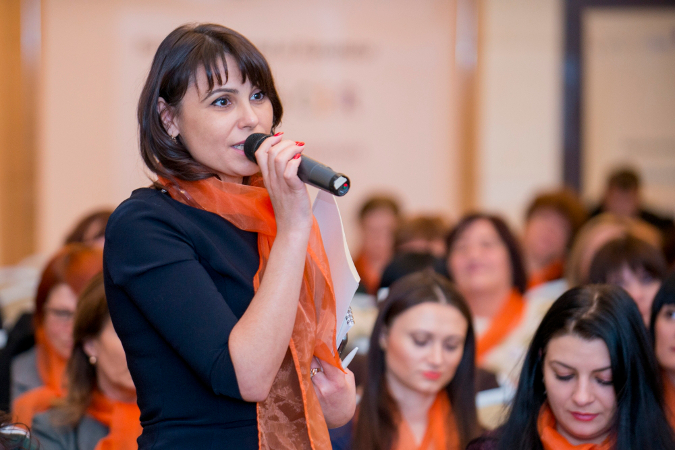Women in Politics

UN Programme “Women in Politics” in Moldova
Women’s representation in Moldova’s politics and decision-making is below international benchmarks and does not meet the country’s national and international commitments. Only 22 per cent of Moldova’s members of Parliament are women. In 2015, women held 20.6 per cent of mayoral mandates, and made up 30.04 per cent of local councils and 18.55 per cent of district councils.
Boosting women’s political participation and decision-making is fundamental for democracy and to achieve sustainable development in Moldova.
The joint UN Women-UNDP Women in Politics (WiP) initiative, Enhancing Women’s Political Representation through improved capacity and enhanced support in Moldova, works to increase women’s participation in Moldova politics and decision-making. It promotes increased public awareness of women’s contributions to political leadership and public and business life, and supports the Government of Moldova as it implements its commitments to women’s rights.
Funded by the Government of Sweden, and run by UN Women and UNDP in partnership with the civil society organizations East-Europe Foundation (EEF) and the Centre Partnership for Development (CPD), the Women in Politics initiative:
- Supports women as candidates and voters;
- Provides support to elected women MPs and councillors;
- Works to build more gender-responsive electoral management bodies;
- Helps develop and advocate for adoption of legislation and policies that promote women in decision-making;
- Promotes gender-responsive media coverage of women and political issues;
- Works with communities to nominate women candidates;
- Enhances the dialogue between women citizens and Members of Parliament;
- Identifies male champions in Moldova and includes men in all advocacy and capacity building.
In 2016, Women in Politics will:
- Organise debates and support government efforts to develop laws governing sexist advertising;
- Continue self-assessment at 30 media outlets to train journalists in gender-sensitive reporting;
- Work with the Central Electoral Commission (CEC) and Centre for Continuous Electoral Training of Moldova (CCET) to improve their gender balance;
- Train newly elected women councillors and mayors in leadership and local governance;
- Help Roma and other under-represented women to develop political skills and networks;
- Continue local forums of MPs and constituents, particularly women from diverse backgrounds.
UN Women in Action
Highlights from the Joint Women in Politics Programme:
- Voter education campaigns for 2014 parliamentary and 2015 local elections reach 442,096 people and increase Roma voter turnout in seven targeted communities by 60 per cent.
- WiP trained nearly 1,000 women candidates and helped elect 98 women – eight mayors and 90 local councillors, including Moldova’s first two Roma women councillors.
- The Gender Equality Platform has been established – which is a Network of civil society organizations and individuals – actively advocating for gender equality.
- The CEC’s Centre for Continuous Electoral Training of Moldova (CCET) uses WiP materials to train 11,163 people before 2015 local elections.
- The CCET and CEC take lead in establishing an International Association of Women in Electoral Management Bodies.
- 30 media outlets review their coverage from a gender equality perspective. Six of these have visibly balanced their coverage in six months.
- Launched Moldova’s first ever National Photo Contest, which generates photos featured in 30 national and local exhibitions that showcase inspirational women and men in non-traditional domains. Over 15,000 people visited the exhibition.
- First mentorship program for first time women counsellors launched.
- Political clubs set up in five districts facilitate dialogue between parties and prospective women candidates and serve as leadership development centres for women candidates and elected officials.
- Helps train nearly 200 elected women local and district councillors in local council functions, fostering gender equality in local development, finance, fundraising and communications.